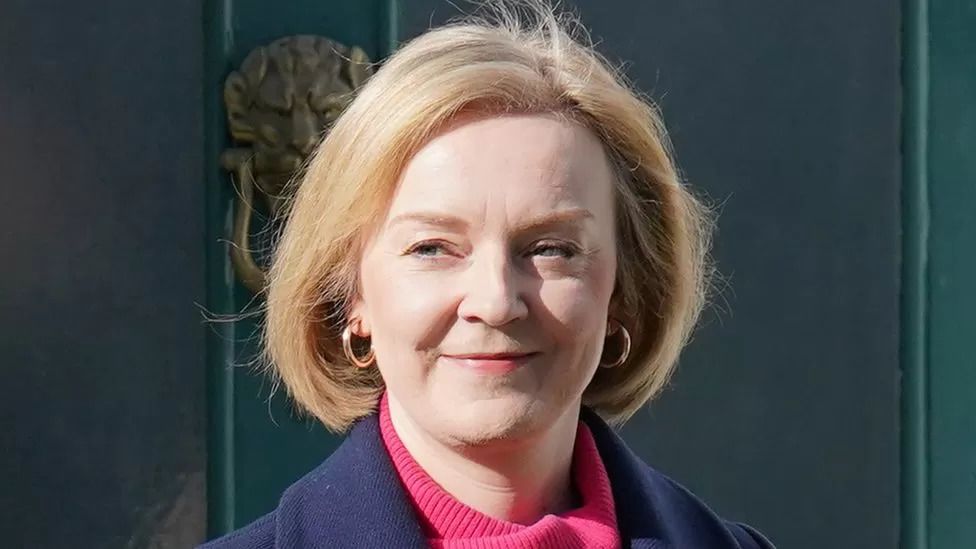
Chris Mason: Sunak's backseat-driving former prime ministers
The problem for Rishi Sunak is he has a minibus full of them behind him.
There are seven!
Sir John Major, Sir Tony Blair, Gordon Brown, David Cameron, Theresa May, Boris Johnson and Liz Truss.
The final three are still in the House of Commons.
The latest to lurch their hands towards the minibus wheel - Liz Truss.
We have heard nothing from her in person since she left office.
Until now.
 Ms Truss spoke out for the first time this weekend since she was forced to resign as prime minister
Ms Truss spoke out for the first time this weekend since she was forced to resign as prime minister
And so, by implication, a critique of Mr Sunak, even though he wasn't mentioned at all in her article, and only fleetingly in her interview.
And all this, incidentally, after Boris Johnson was interviewed on TalkTV by Sunak sceptic and fellow Conservative MP Nadine Dorries on Friday night.
And before Sir John Major appears in front of MPs on Tuesday to talk about the Northern Ireland Protocol, one of the thorniest issues the prime minister faces.
What should we take from Ms Truss's argument?
The key thing is she holds to the view that her diagnosis of the UK's problems, as she sees them, is a lack of growth, and the underlying reason for this is an insufficiently Conservative approach to managing the economy - not least cutting tax.
Whatever you might think of that argument, it matters, because it illustrates in technicolour a discussion that burns away within the Conservative Party.
So, to Ms Truss in her own words in her Spectator interview.
Interesting, for we've heard nothing from her since she left office, until now.
There are moments of considerable understatement.
Things "didn't work out", she says.
There was "system resistance" she argues - the civil service and others, she claims, were sceptical about her approach.
She had, she acknowledges, "insufficient political support".
Again, an observation with a sprinkling of understatement.
There is at least some candour, too, about what she sees as her failings - "the communication wasn't good enough", and "I didn't have good enough infrastructure", a reference to the team assembled around her.
She wasn't questioned directly and bluntly on her tendency in both the Telegraph and the Spectator to blame plenty of other people while appearing to accept a limit to her personal responsibility.
Nor to apologise for causing a period of unprecedented political turmoil.
She accepts now that "I simply did not know about" what are called Liability Driven Investments - something at the core of the market turbulence that came along after her disastrous mini budget.
There is both an acknowledgement of ignorance but a delivery of blame - suggesting the Treasury or Bank of England should have warned her.
Perhaps they should.
But her rival in the leadership race in the summer, the man who is now prime minister, had said over and over again her economic plans would be a disaster.
In an interview that was more intellectual than theatrical or particularly challenging, Liz Truss did, though, sketch out a fascinating argument about what she sees as the country's - and even the Conservative Party's - political instincts right now.
They are, she concludes, at odds with her own, and that helps explain why she failed.
Is Truss right?
She argues that, in the UK and elsewhere, there has been what she calls a "drift" towards "more socially democratic policies: higher taxes, higher spending, bigger government, relatively low interest rates and cheap money. There's no doubt that those of us on the side of politics who believe in smaller government and free markets have not been winning the argument."
Including, that is, to those in her own party.
Why might this be? The cuts since 2010? The massive government interventions during the pandemic? The state of public services?
Taxes and government spending are at generationally high levels, with neither the Conservatives or Labour promising to radically reduce this any time soon.
So perhaps, in that observation of political reality right now, Ms Truss is right.
But - fairly or otherwise - has her stint as prime minister, as short as it was calamitous, buried her political philosophy in a box marked "toxic, never reopen"?
Plenty of Conservatives think the blunt truth to that is yes, at least any time soon.
Others, who are more sympathetic, wonder if there are elements of her prospectus, around housebuilding and childcare for instance, where there may be hope of them being dug up and reincarnated.
Let's see.
Labour, privately, are delighted various former occupiers of No 10 are now occupying the airwaves too.
Meanwhile, the prime minister's official spokesman has said that Mr Sunak "will always listen to views of former prime ministers" and that it's "healthy to have a diverse debate".
Can you hear the gritted teeth from where you are too?
Watch: Liz Truss on whether or not she wants to be PM again










